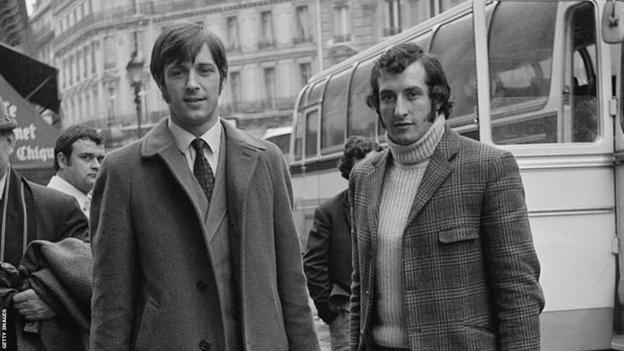He was known simply as ‘The King’.
Barry John is recognised as the first rugby union superstar and one of the sport’s greatest players.
John played a key role in Wales’ 1971 Five Nations Grand Slam and inspired the British Lions to what is still their only New Zealand tour series win in the same year.
His impact on the sport could never be overstated, as an imperious fly-half whose seemingly effortless ability to beat defenders often defied logic and gained him worldwide admiration.
He was a mesmeric runner, a brilliant kicker, a player who could do things nobody else seemed capable of.
This mercurial talent retired when he was only 27 years old, likening the pressure of carrying the hopes of a rugby-obsessed nation to “living in a goldfish bowl”.
After retiring, he stayed in rugby as a respected columnist and broadcaster.
Rising star
Born in Cefneithin, a village in Carmarthenshire, John was one of six children. All three of his brothers – Delville, Alan and Clive – played rugby.
He was still a teenager at Gwendraeth Grammar School when he made his try-scoring debut for Llanelli.
With rugby union still an amateur sport, John continued to play for Llanelli while studying at Trinity College in Carmarthen, with ambitions of becoming a teacher.
Those aspirations, however, were secondary to his burgeoning career as a rugby player.
It was clear from an early age John was a once in a generation talent: an agile and daring runner blessed with electric pace and a brilliant rugby brain which helped him dictate games with a tactical maturity beyond his years.
He made his Wales debut in 1966 and, although he had stiff competition in the form of David Watkins and later Phil Bennett, he soon made the fly-half position his own.
In 1967, John joined Cardiff where he formed a formidable half-back partnership with the great Sir Gareth Edwards. “You throw it and I will catch it” was the mantra they adopted in an almost telepathic partnership.
After injury cut short his tour to South Africa with the ’68 Lions, John helped Wales win the 1969 Five Nations Championship.
Two years later marked the dawn of what many consider to be the golden era of Welsh rugby, when John, Edwards and other established stars such as Gerald Davies and John Dawes were joined by blossoming world-class talents JPR Williams and Mervyn Davies.
Wales clinched the 1971 Grand Slam – their first since 1952 – with an outstanding win in France, in which John and Edwards scored all their points. John demonstrated his defensive resilience by breaking his nose in a try-saving tackle.
‘The King’

That Welsh side – often mentioned in debates about rugby’s greatest teams – formed the nucleus of the Lions squad which toured New Zealand that year.
They were coached by legendary figure Carwyn James, who was John’s mentor, with both men hailing from the same Cefneithin village.
With John in irresistible form – scoring 30 of the Lions’ 48 points over four Tests – the tourists triumphed 2-1, making them the first and still the only Lions to win a series in New Zealand. The local press dubbed him “The King” and his legacy was cemented.
The Lions squad returned home to a welcome that transcended rugby.
John recalled the journey home as they flew via the USA with pictures of the Lions in the New York Times. He said “they felt we were more like The Beatles” when landing back at Heathrow Airport.
John seemed to have the world at his feet but, less than a year later, his career was over.
With Wales and Scotland refusing to travel to Ireland because of the political situation and increased violence in Northern Ireland, the 1972 Five Nations was left incomplete.
Wales had won all three of their matches but, denied another Grand Slam after not playing against Ireland, their closing 20-6 victory over France proved to be John’s final international match.
He retired aged just 27, citing the weight of expectation as well as the pressures of fame as the reasons for his decision.
The extreme example he often described was when a young woman curtsied to him in Rhyl at a promotional event for his employers in north Wales.
John’s career might have been relatively short and sweet by modern-day standards, but his legacy was one most players could only dream of.
Wales won three Five Nations titles, a Grand Slam and two Triple Crowns during his stint on the international stage.
Lasting legacy

John stayed connected to rugby after retirement with jobs in journalism. He was a rugby correspondent at the Daily Express, a columnist with Wales on Sunday and Wales Online and co-commentator on BBC Radio Five Live.
John was one of the inaugural inductees of the International Rugby Hall of Fame in 1997.
He was named in the Welsh Sports Hall of Fame two years later and then, in 2015, he took his place in the World Rugby Hall of Fame.
John’s passing follows those in recent times of other Welsh rugby titans, including Phil Bennett,Clive Rowlands and John Dawes.
Following the death of JPR Williams in January, Welsh rugby has now lost two legends this year. We will never see their like again.
John, who lived in Cardiff, is survived by his wife Janet and children Kathryn, Lucy, Anna and David.